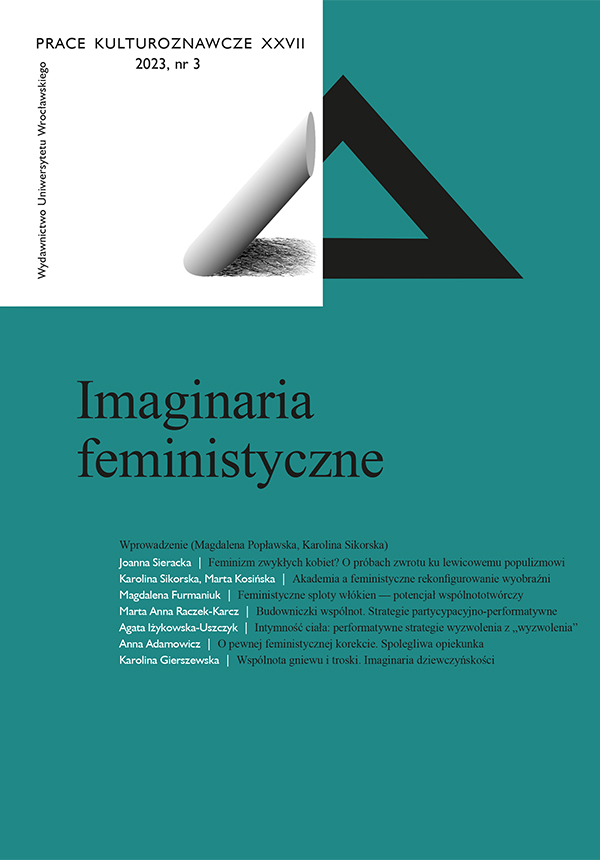

Articles

In this article, we analyze work stories surrounding fine art academies (and art departments at nonart universities) that emerged from in-depth interviews we conducted with female and male research and teaching employees at these institutions. We are interested in how the changing feminist discourse in Poland affects those who function in art academies. We want to learn how the academic imagination is being reframed, and what work figures are emerging in it. Looking at the employment conditions in the academy, we also consider how labour relations are gendered, how gender considered intersectionally marks the labour status of individuals and how it affects attitudes produced towards the institution.
Acker J., Hierarchies, jobs, bodies: A theory of gendered organizations, „Gender and Society” 4, 1992, nr 2, s. 139–158.
Ashencaen Crabtree S., Shiel Ch., „Playing mother”: Channeled careers and the construction of gender in academia, „SAGE Open” 9, 2019, nr 3, https://doi.org/10.1177/2158244019876285.
Bird S., Litt J., Wang Y., Creating status of women reports: Institutional housekeeping as „women’s work”, „NWSa Journal” 16, 2004, nr 1, s. 194–206, https://doi.org/10.2979/NWS.2004.16.1.194.
Bourdieu P., Męska dominacja, przeł. L. Kopciewicz, Warszawa 2004.
Bozzon R., Murgia A., Poggio B., Gender and precarious careers in academia and research: Macro, meso and micro perspectives, [w:] Gender and Precarious Research Careers: A Comparative Analysis, red. A. Murgia, B. Poggio, London-New York 2019, s. 15–49.
Britton D.M., The epistemology of the gendered organization, „Gender and Society” 14, 2000, nr 3, s. 418–434. https://doi.org/10.1177/089124300014003004.
Chromik A., Alma mater — zapiski o akademickiej partyzantce matczynej, [w:] Macierz / Matrix, red. A. Chromik, N. Giemza, K. Bojarska, Kraków 2022, s. 85–106.
Duda M., Dogmat płci. Polska wojna z gender, Gdańsk 2016.
Dziedziczak-Foltyn A., Reformy w polskim szkolnictwie wyższym po 1990 r. w świetle nauki o polityce publicznej, „Studia z Polityki Publicznej” 2018, nr 2 (18), s. 9–23. https://doi.org/10.33119/KSzPP.2018.2.1.
European Commission, Directorate-General for Research and Innovation, She Figures 2021: Gender in Research and Innovation. Statistics and Indicators, Luxembourg 2021, https://data.europa.eu/doi/10.2777/06090.
Fortuna P., Dyskryminacja na Akademii Sztuk Pięknych? Studentki i studenci walczą o równe traktowanie, „Gazeta Wyborcza Warszawa”, 14.03.2018, https://warszawa.wyborcza.pl/warszawa/7,54420,23139152,dyskryminacja-na-akademii-sztuk-pieknych-studenci-i-studentki.html.
Górska A.M., Gender and Academic Career Development in Central and Eastern Europe, London-New York 2023.
Guarino C.M., Borden V.M.H., Faculty service loads and gender: Are women taking care of the academic family?, „Research in Higher Education” 58, 2017, nr 6, s. 672–694.
Hardy J., Nowy polski kapitalizm, przeł. A. Czarnacka, Warszawa 2010.
Hill R.L., Allen K., „Smash the patriarchy”: The changing meanings and work of „patriarchy” online, „Feminist Theory” 22, 2021, nr 2, s. 165–189, https://doi.org/10.1177/1464700120988643.
Kowalik T., WWW.Polskatransformacja.pl, Warszawa 2009.
Kozek W., Destruktorzy. Tendencyjny obraz związków zawodowych w tygodnikach politycznych w Polsce, [w:] Instytucjonalizacja stosunków pracy w Polsce, red. W. Kozek, Warszawa 2003.
Kulczycki E., Korzeń M., Korytkowski P., Toward an excellence-based research funding system: Evidence from Poland, „Journal of Informetrics” 11, 2017, nr 1, s. 282–298, https://doi.org/10.1016/j.joi.2017.01.001.
Marne szanse na awanse? Raport z badania na temat obecności kobiet na uczelniach artystycznych w Polsce, red. A. Gromada, D. Budacz, J. Kawalerowicz, A. Walewska, Warszawa 2015.
Mrozowicki A., Karolak M., Czarzasty J., , Gardawski J., Drabina-Różewicz A., Krasowska A., Andrejczuk M., Prekaryzacja pracy a świadomość społeczna i strategie życiowe ludzi młodych: ramy teoretyczne, [w:] Oswajanie niepewności. Studia społeczno-ekonomiczne nad młodymi pracownikami sprekaryzowanymi, red. A. Mrozowicki, J. Czarzasty, Warszawa 2020.
Nacher A., #BlackProtest from the web to the streets and back: Feminist digital activism in Poland and narrative potential of the hashtag, „European Journal of Women’s Studies” 28, 2021, nr 2, s. 260–273, https://doi.org/10.1177/1350506820976900.
Smolarska Z., Lewandowska K. , Kulczycki E., Artyści wobec kultury audytu. Wpływ systemu ewaluacji nauki na uczelnie artystyczne, „Nauka” 2022, nr 3, https://doi.org/10.18150/G2KWLV, V1.
Solnit R. , Mężczyźni objaśniają mi świat, przeł. A. Dzierzgowska, Kraków 2017.
Ward J., „Not all differences are created equal”: Multiple jeopardt in a gendered organization, „Gender and Society” 18, 2004, nr 1, s. 82–102, http://www.jstor.org/stable/4149375.
Woś R., To nie jest kraj dla pracowników, Warszawa 2017.
Wyrostek M., Wpływ kultury organizacyjnej na jakość pracy w przedsiębiorstwie, „Rynek – Społeczeństwo – Kultura” 2012, nr 2, s. 43–49.